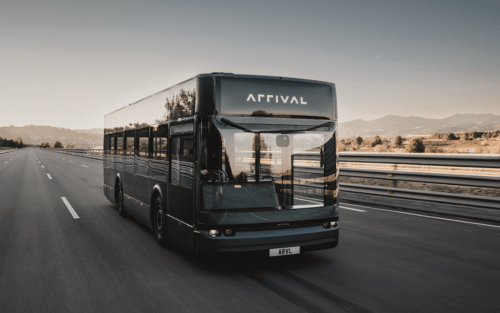The EV manufacturer has seen its share price slump, and is now seeking to cut costs and focus on starting Van production to start bringing in revenue and improve its financial prospects
On July 12, electric vehicle manufacturer Arrival announced that it had proposed a reorganisation of its business in response to the challenging economic environment as it focuses on its next major milestone, starting production of the Arrival Van in the third quarter of 2022 which will enable it to start generating revenue.
Arrival was founded in 2015 and has consumed significant sums of money in developing its microfactory concept alongside its van and bus products, and reported significant interest from major groups in its electric delivery vans, including up to 20,000 orders from UPS, as well as from First Bus which was to operate the first Arrival Bus product. However, the manufacturer has yet to deliver a single production-series vehicle. Having merged with a special purpose acquisition company two years ago, Arrival was listed on the Wall Street stock exchange just over a year ago, since when the firm’s shares have lost around 90% of their value.
The manufacturer has proposed plans that include ‘a realignment of the organisation’ that would enable it to deliver business priorities until late 2023 primarily utilising the $500m of cash on hand. Arrival’s proposal includes ‘a targeted 30% reduction in spend’ across the organisation; the firm anticipated that the move could potentially impact up to 30% of employees globally.
Arrival says it continues to see a huge amount of interest in its products, and believes that its proposals are the right step to ensure the long term success of the business and enable it to service this demand in the face of a unique economic environment that is seeing both new players and traditional OEMs facing supply chain issues, including the coronavirus pandemic, geopolitical tensions and rising inflation. The company said it believes it must address these challenges now, as it starts production this year.
The manufacturer went on to say in a statement that its vertical integration and new method for the production of electric vehicles using microfactories, puts it in a ‘unique position to respond to global issues’ such as these, with the proposed changes enabling it to be ‘even more agile’ in the face of ongoing global uncertainty. It added that it remains committed to starting production of its Van in the third quarter of this year and is preparing the business for the unique opportunity ahead.
The Financial Times reports that the London-based company, which has a UK production facility in Bicester, is ‘delaying trials of its bus and pausing development work on its car project, according to three people familiar with the matter.’
Developed alongside its Bus and Van product, the firm was also working on plans to build its new car product, designed for ride-hailing in collaboration with Uber and which was due to enter production late in 2023. That project remains under review, an insider told the Financial Times, and may be reprised once the firm is generating cash.
The bus was due to start undergoing trials with First Bus after gaining European type approval. Asked about the delay, a First Bus spokesperson said: “First Bus has worked alongside Arrival on this journey for some time and has been impressed with the product they have developed. We remain keen to reignite the relationship once Arrival’s bus programme has resumed, working together to support our commitment to operating a zero-emission bus fleet by 2035.”
Testing of the bus product was also taking place with Enel X in Italy, where Enel X parent company Enel was looking to include the Bus in its portfolio of electrification solutions. Arrival said that customer trials and investment in the Bus microfactory will continue once it secures additional capital.
Second quarter results
On 11 August, Arrival reported financial results for the second quarter to 30 June 2022. “We have had big achievements in Q2 including the European certification of our Van and Bus products and successful internal trials of both Van and Bus on public roads. In addition, we’ve made recent strategic decisions that will allow us to start production this quarter in Bicester, deliver our first vehicles to UPS this year, and start production in Charlotte (US) in 2023. We are excited to be drawing closer to producing vehicles in our first ever microfactory in a few weeks – a moment that we believe will fundamentally change the automotive industry. The start of our first microfactory is a big step towards achieving our vision, it is the move from 0 to 1,” said Denis Sverdlov, Arrival’s founder and CEO.
The company ended the second quarter of 2022 with approximately $513 million of cash and cash equivalents, and is establishing a $300 million At The Market (ATM) platform. Along with the restructuring programme, this is expected to allow the company to start production this quarter in Bicester, delivering its first vehicles to UPS this year, and to start production in Charlotte in 2023. The delays to the Charlotte production line are attributed to ‘capitalising on learnings and opportunities’ from the Bicester site, and mean that initial output for the US market is expected to be shipped from the UK. The firm expects lower production volumes in 2022 compared to previous estimates, and said it will continue to opportunistically consider additional sources of capital.
The firm reports that demand for products grew, with non-binding memorandums of understanding and orders increasing to around 149,000 vehicles, which, if all completed, amount to over $6 billion in potential revenue.


